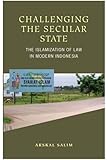Challenging the Secular State : The Islamization of Law in Modern Indonesia / Arskal Salim.
Material type: TextPublisher: Honolulu : University of Hawaii Press, [2008]Copyright date: ©2008Description: 1 online resource (288 p.) : 1 line drawingContent type:
TextPublisher: Honolulu : University of Hawaii Press, [2008]Copyright date: ©2008Description: 1 online resource (288 p.) : 1 line drawingContent type: - 9780824832377
- 9780824861797
- 340
- online - DeGruyter
- Issued also in print.
| Item type | Current library | Call number | URL | Status | Notes | Barcode | |
|---|---|---|---|---|---|---|---|
 eBook
eBook
|
Biblioteca "Angelicum" Pont. Univ. S.Tommaso d'Aquino Nuvola online | online - DeGruyter (Browse shelf(Opens below)) | Online access | Not for loan (Accesso limitato) | Accesso per gli utenti autorizzati / Access for authorized users | (dgr)9780824861797 |
Frontmatter -- Contents -- Acknowledgments -- Abbreviations -- Introduction -- I: Shari'a and the Nation-State -- 1. The Notion of Shari'a -- 2. Is There Unity of Islam and the State? -- 3. Dissonant Implementation of Shari'a -- 4. Between Nation and Millet -- II: Islamization and Nationalism -- 5. Islamization in Indonesia -- 6. Different Conceptions of Nationalism -- 7. Formation of the Indonesian State -- 8. Reproducing the Millet System -- III: The Constitutionalization of Shari'a -- 9. Constitutional Dissonance -- 10. Bringing Back the 'Seven Words' -- 11. The Failure of Amendment -- 12. Limiting Human Rights -- IV: The Nationalization of Shari'a -- 13. The Institutionalization of Zakat -- 14. Managing the Collection of Zakat -- 15. Legislating Zakat Payment -- 16. Overlapping Zakat and Taxation -- V: The Localization of Shari'a in Aceh -- 17. Formalizing Shari'a Locally Through Ulama -- 18. Ulama and Qanun Lawmaking -- 19. After the Tsunami -- Conclusion -- Notes -- Glossary -- References -- Index -- About the Author
restricted access online access with authorization star
http://purl.org/coar/access_right/c_16ec
Challenging the Secular State examines Muslim efforts to incorporate shari'a (religious law) into modern Indonesia's legal system from the time of independence in 1945 to the present. The author argues that attempts to formally implement shari'a in Indonesia, the world's most populous Muslim state, have always been marked by tensions between the political aspirations of proponents and opponents of shari'a and by resistance from the national government. As a result, although pro-shari'a movements have made significant progress in recent years, shari'a remains tightly confined within Indonesia's secular legal system.The author first places developments in Indonesia within a broad historical and geographic context, offering a provocative analysis of the Ottoman empire's millet system and thoughtful comparisons of different approaches to pro-shari'a movements in other Muslim countries (Saudi Arabia, Iran, Pakistan). He then describes early aspirations for the formal implementation of shari'a in Indonesia in the context of modern understandings of religious law as conflicting with the idea of the nation-state.Later chapters explore the efforts of Islamic parties in Indonesia to include shari'a in national law. Salim offers a detailed analysis of debates over the constitution and possible amendments to it concerning the obligation of Indonesian Muslims to follow Islamic law. A study of the Zakat Law illustrates the complicated relationship between the religious duties of Muslim citizens and the nonreligious character of the modern nation-state. Chapters look at how Islamization has deepened with the enactment of the Zakat Law and demonstrate the incongruities that have emerged from its implementation. The efforts of local Muslims to apply shari'a in particular regions are also discussed. Attempts at the Islamization of laws in Aceh are especially significant because it is the only province in Indonesia that has been allowed to move toward a shari'a-based system. The book concludes with a review of the profound conflicts and tensions found in the motivations behind Islamization.
Issued also in print.
Mode of access: Internet via World Wide Web.
In English.
Description based on online resource; title from PDF title page (publisher's Web site, viewed 02. Mrz 2022)


